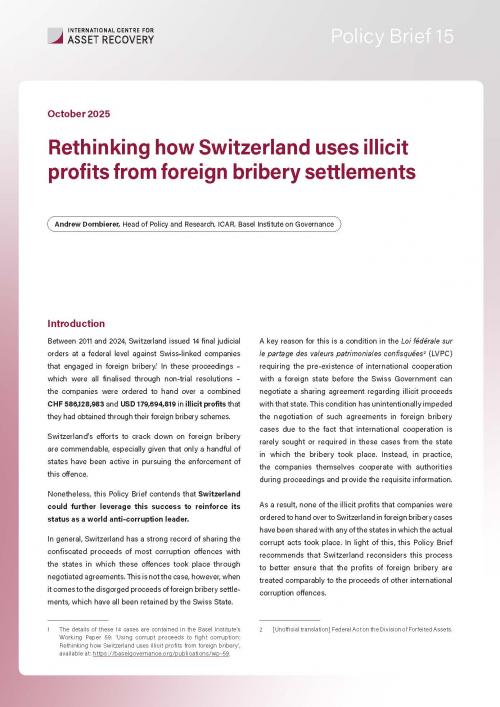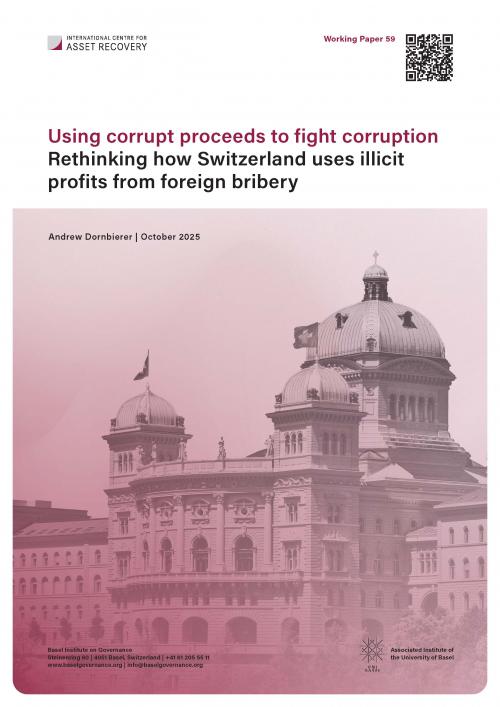How Switzerland is seeking to return illicit assets to Ukraine

Switzerland has launched administrative proceedings to confiscate over USD 100 million in assets linked to the regime of former Ukrainian president Viktor Yanukovych, with the ultimate aim of returning these to Ukraine.
The assets are held by a close associate of the former president, Yuriy Ivanyushchenko and his family. They have been frozen in Switzerland since Yanukovych was deposed in Ukraine’s 2014 Revolution of Dignity.
As described in the press release, the decision on 25 May 2022 to initiate confiscation proceedings is unrelated to the Russian sanctions.
The significance of this decision goes beyond the hoped-for return of over USD 100 million to the people of Ukraine at a time of immense need. The move demonstrates how States can proactively seek ways to use their full legal toolkit to confiscate illicit assets linked to political exposed persons (PEPs) and ensure they are put to good use.
Appropriate use of Switzerland’s Foreign Illicit Assets Act
The proceedings are based on a law in force in Switzerland since 1 July 2016, the Foreign Illicit Assets Act (FIAA). This:
“governs the freezing, confiscation and restitution of assets held by foreign politically exposed persons or their close associates, where there is reason to assume that those assets were acquired through acts of corruption, criminal mismanagement or by other felonies.”
In particular, Article 4.2 of the FIAA sets out conditions of its use, including that:
"a country is unable to satisfy the requirements of MLA owing to the total or substantial collapse, or the impairment, of its judicial system (failure of state structures)."
This provision is critical because, unlike some simplified reports have stated, it does not apply to what is commonly referred to as "failed state" only. Rather, it also applies to a country that is willing to cooperate but unable to because relevant aspects of its judicial system are impaired to such an extent that they cannot complete the mutual legal assistance (MLA) procedures.
Before the Russian invasion, Ukraine had been cooperating extensively with the Swiss authorities on the Ivanyushchenko case. The administrative freeze on the assets had been upheld and renewed as a consequence of the ongoing cooperation. The war has changed the situation: the country is still willing to cooperate but no longer able to.
What’s next?
The Federal Department of Finances will formally issue proceedings at the Federal Administrative Court requesting the confiscation of the assets in question. The latter will then need to determine whether the conditions for confiscation under the FIAA are met. Whether Ukraine is or is not capable of MLA will be one of the crucial points to examine in this regard.
If the FIAA is applied, there is a legal presumption that the assets are of illegal origin unless the holder of the assets is able to demonstrate that they were acquired legitimately. The asset holder (Ivanyushchenko) may appeal the verdict of the Federal Administrative Court before the Swiss Federal Tribunal, which will decide definitively.
If the confiscation is definitively pronounced by the courts at the end of this process, the Federal Government has already announced that it intends to return the confiscated assets to Ukraine. Typically, the end use of the assets will be discussed and agreed upon bilaterally between Switzerland and Ukraine.
Looking ahead
The Basel Institute has been supporting the relevant authorities in Ukraine since 2014, including in cases related to assets frozen in Switzerland. We very much welcome the Federal Council’s decision to apply the FIAA in this case, considering it is precisely what the law is intended for.
This is only the second time that the FIAA is being applied. It may thus set important precedents and open the door to future confiscation in relevant circumstances.



